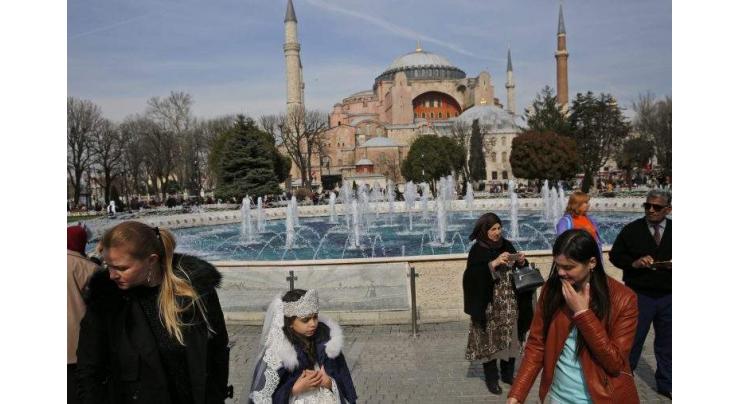
Athens Reminds Turkey Of Cultural Heritage Status Of Hagia Sophia Museum In Istanbul
Sumaira FH Published March 25, 2019 | 09:34 PM

Greek Foreign Minister George Katrougalos said on Monday, commenting on a recent statement by Turkish President Recep Tayyip Erdogan, the he hoped the Turkish leadership would respect the status of Hagia Sophia in Istanbul as a UNESCO World Cultural Heritage and not revert the museum back into a mosque
ATHENS (UrduPoint News / Sputnik - 25th March, 2019) Greek Foreign Minister George Katrougalos said on Monday, commenting on a recent statement by Turkish President Recep Tayyip Erdogan, the he hoped the Turkish leadership would respect the status of Hagia Sophia in Istanbul as a UNESCO World Cultural Heritage and not revert the museum back into a mosque.
On Sunday, Erdogan suggested that Hagia Sophia, which used to be an Orthodox Christian cathedral before becoming a mosque and then a museum, could become a mosque again with free admission.
"Hagia Sophia is not only a great temple of Christianity, the greatest temple in many centuries, it is also the heritage of mankind. It was recognized by UNESCO as part of our world cultural heritage. Questioning this status is not only an insult to the feelings of Christians, but also an insult to the international community and international law," Katrougalos told reporters.
The minister recalled Erdogan's statements of March 16, when the Turkish president said that he would not participate on the issue of turning Hagia Sophia into a mosque since it had a political dimension.
"We want to hope that the correct statements of the Turkish leadership of March 16 would be in force and this status [of the cathedral as a museum] will not change," the minister said.
Hagia Sophia in Constantinople had been the largest temple in the Christian world for more than a thousand years. After the seizure of Constantinople in 1453 and the fall of the Byzantine Empire, the cathedral was transformed into a mosque. In 1934 the building became a museum by a decree of Mustafa Kemal Ataturk, the founder of the modern Turkish state. In 1985, it was included in the UNESCO World Heritage List.
Recent Stories

BISP embraces E-procurement: launches inaugural tender

Modi govt broken all records of oppression to win elections: President AJK

PM for further strengthening economic, trade ties with Turkiye

Administrative machinery actively checking price, weight of roti/naan: minister

Advisor asks tourists to avoid visiting Kaghan during current rains

Business community indebted to Ahsan Zafar for his unprecedented services: Yousu ..

Three Filipinos dead in UAE floods: officials

DC Larkana chairs meeting to review strategy for anti-Polio drive

Registration process under BISP continues in Sargodha

QAU announces scholarships for KP students

Prisoner commits suicide in Timergara Jail

RCB takes action against selling expired food items
More Stories From World
-

Three Filipinos dead in UAE floods: officials
1 hour ago -

Global calls for calm after reported Israeli strike on Iran
56 minutes ago -

Iran blasts rattle global markets
1 hour ago -
H5N1 strain of bird flu found in milk: WHO
1 hour ago -

Court aims to wrap Trump jury selection ahead of opening arguments
2 hours ago -

Croatia top court bars president from becoming next PM
2 hours ago
-
Hindu nationalist Modi the favourite as India votes
3 hours ago -
French police surround Iran consulate in Paris: security source
3 hours ago -
Blinken says US 'not involved in any offensive operation'
3 hours ago -
Beijing half marathon runners stripped of medals after controversial finish
3 hours ago -
Sudanese rue shattered dreams as war enters second year
3 hours ago -
Eight killed in Russian strikes
4 hours ago




